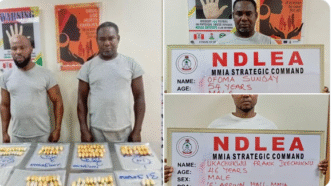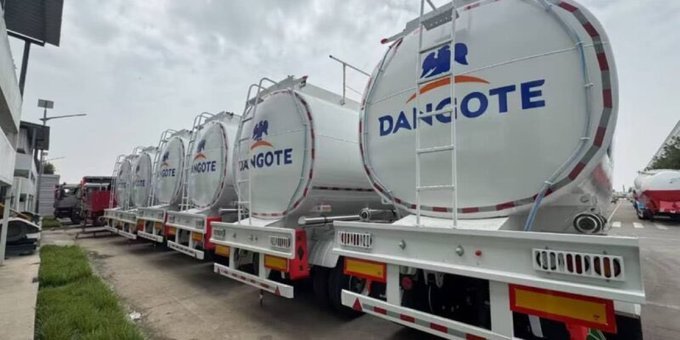In yet another major breakthrough in the fight against drug trafficking, the National Drug Law Enforcement Agency (NDLEA) has intercepted two passengers returning from Brazil with a combined total of 116 wraps of illicit substances. The suspects, identified as Ofoma Sunday and Ukachukwu Frank Ikechukwu, were arrested upon arrival at the Murtala Muhammed International Airport (MMIA), Ikeja, Lagos.
According to NDLEA officials, the two men were placed under strict observatory custody after they exhibited behaviors consistent with drug ingestion. After several days of monitoring, both suspects excreted multiple wraps of heroin and cocaine, confirming suspicions that they were drug couriers attempting to smuggle narcotics into Nigeria.
The arrests underscore NDLEA’s relentless efforts to dismantle international drug trafficking syndicates and protect Nigeria from the scourge of narcotics abuse.
How the Arrest Was Made
Sources at the airport disclosed that Ofoma Sunday and Ukachukwu Frank Ikechukwu had flown in from São Paulo, Brazil, one of the world’s leading sources of cocaine shipments. Acting on intelligence reports, NDLEA officers at the MMIA subjected the duo to thorough checks.
Their nervous behavior during screening reportedly raised suspicion, prompting authorities to place them under observation. During the process, both men began excreting wraps of drugs over several days. In total, officials recovered 116 wraps containing heroin and cocaine.
NDLEA Chairman/Chief Executive Officer, Brig. Gen. Mohamed Buba Marwa (Retd.), praised the officers for their vigilance, noting that such arrests demonstrate the agency’s commitment to staying ahead of traffickers who continue to devise sophisticated methods of smuggling hard drugs.
Inside the Modus Operandi of Drug Couriers
The use of human couriers, also known as “body packers” or “mules,” remains one of the riskiest but common methods employed by international drug cartels. Couriers ingest pellets or wraps of narcotics, conceal them in body cavities, or tape them to their bodies in attempts to evade airport detection.
However, this method carries deadly risks. A single ruptured drug pellet in the stomach or intestine can lead to instant overdose and death. For this reason, NDLEA maintains strict protocols for suspected mules, placing them under medical and security surveillance until all ingested substances are excreted.
In the case of Sunday and Ikechukwu, both men are believed to have swallowed dozens of pellets before boarding their flight from Brazil to Nigeria. Investigations are ongoing to determine their sponsors and whether they are linked to a larger drug syndicate.
Brazil-Nigeria Drug Trafficking Route
Nigeria has long been a major target destination for drug syndicates operating from South America. Brazil, Colombia, and Peru are some of the world’s largest producers of cocaine, while parts of Asia are known for heroin production. The West African corridor, particularly Nigeria, has increasingly become a transit hub for the global narcotics trade.
Over the past decade, NDLEA has intercepted multiple shipments of drugs smuggled from Brazil into Lagos and Abuja airports. Couriers often exploit Nigeria’s large population and vibrant air traffic to conceal their illegal trade.
By dismantling such attempts, NDLEA not only protects Nigerian communities from drug abuse but also strengthens the country’s international reputation as a partner in the global war against drugs.
NDLEA’s Intensified Crackdown on Traffickers
Since 2021, NDLEA under Marwa’s leadership has intensified its crackdown on traffickers through intelligence-led operations, enhanced surveillance at airports, and strengthened international collaboration.
Statistics show that the agency has intercepted thousands of kilograms of cocaine, heroin, methamphetamine, and cannabis in recent years. Several notorious kingpins have also been arrested and are currently facing trial.
NDLEA’s collaborations with foreign partners such as the United States Drug Enforcement Administration (DEA), the United Nations Office on Drugs and Crime (UNODC), and Brazilian law enforcement have further boosted its capacity to track cross-border trafficking networks.
Human Cost of Drug Trafficking
Beyond the sensational arrests, the human cost of drug trafficking cannot be ignored. Young Nigerians are often lured by promises of quick wealth, only to find themselves trapped in a dangerous cycle of exploitation by international cartels.
Couriers face not only the risk of imprisonment but also potential death from drug ingestion. Many who are caught spend years in prison, while some die during the dangerous smuggling process. Experts warn that unless awareness campaigns are strengthened, vulnerable Nigerians will continue to be recruited as disposable couriers.
NDLEA’s Warning to Drug Syndicates
Following the arrest of the two Brazil returnees, NDLEA reiterated its zero-tolerance stance on drug trafficking. The agency warned that traffickers who attempt to exploit Nigerian airports will face the full weight of the law.
“Every attempt to use our airports for drug trafficking will be met with decisive resistance. NDLEA officers are trained, equipped, and ready to dismantle these networks,” an official declared.
The suspects, Sunday and Ikechukwu, are currently in custody and will be charged to court upon the conclusion of investigations. If convicted, they face lengthy prison sentences under Nigeria’s stringent anti-drug laws.
Community Reactions and Calls for Vigilance
The news of the arrests has sparked widespread reactions among Nigerians. Many citizens commended NDLEA for its vigilance, while others expressed concern about the rising number of young Nigerians entangled in drug-related crimes.
Civil society groups have called for stronger rehabilitation and public education programs to discourage vulnerable individuals from being recruited by cartels. “It is not enough to arrest couriers. We must address the root causes of unemployment, poverty, and desperation that make young people targets of drug lords,” said a Lagos-based human rights activist.
Broader Implications for National Security
Drug trafficking does not only fuel addiction and crime; it also poses a direct threat to Nigeria’s national security. Proceeds from narcotics are often linked to the financing of organized crime, including terrorism, human trafficking, and arms smuggling.
By intercepting drug couriers and dismantling their networks, NDLEA plays a critical role in safeguarding the country’s stability. Security analysts argue that continued investment in intelligence gathering, airport technology, and inter-agency collaboration is vital for sustaining this momentum.
Conclusion
The arrest of Ofoma Sunday and Ukachukwu Frank Ikechukwu at the Lagos airport with 116 wraps of heroin and cocaine is a sharp reminder of the persistent battle Nigeria faces against international drug trafficking syndicates. While NDLEA’s proactive surveillance and timely intervention prevented another consignment of deadly substances from hitting Nigerian streets, the fight is far from over.
As the agency continues to tighten its grip on traffickers, the responsibility also falls on communities, families, and policymakers to address the deeper socio-economic issues that make Nigerians vulnerable to exploitation.
For now, Kaduna residents and Nigerians at large will watch closely as NDLEA prosecutes the suspects, reaffirming its message: drug trafficking has no safe haven in Nigeria.














